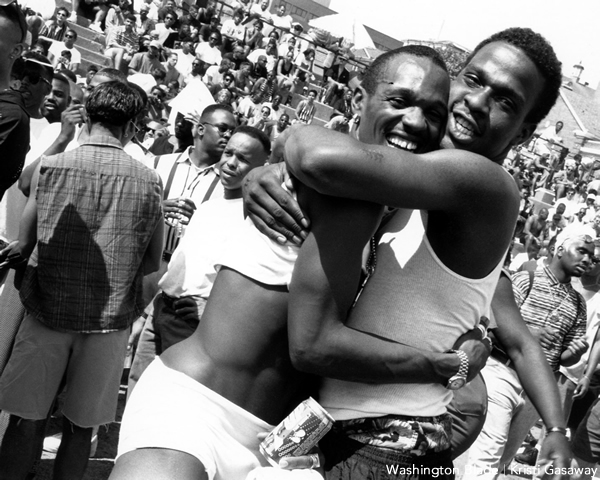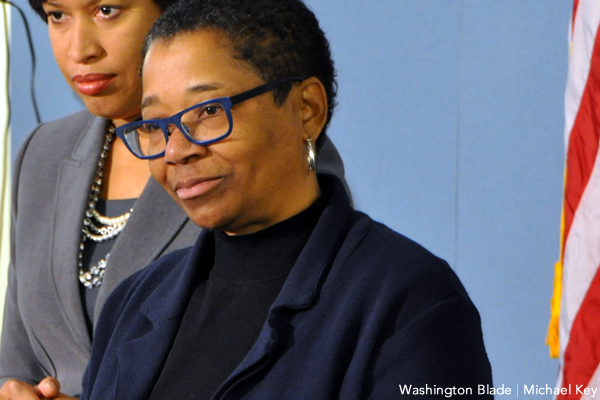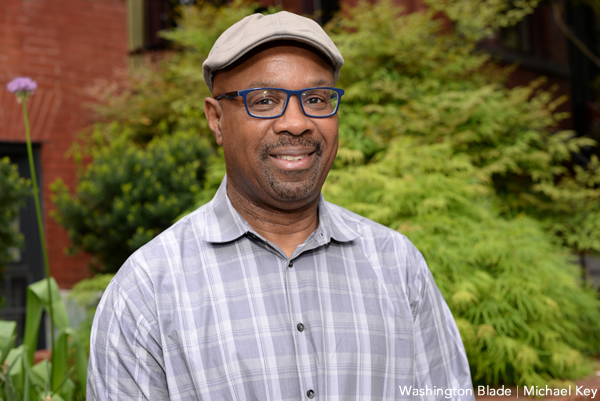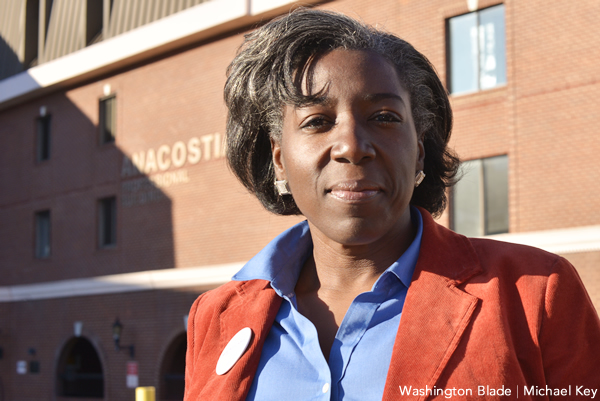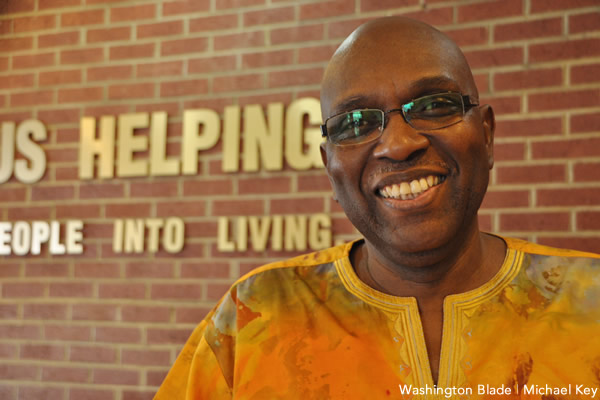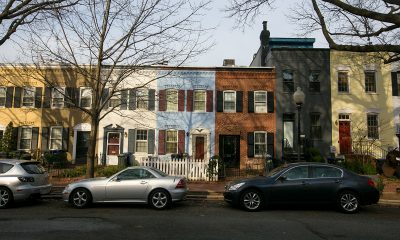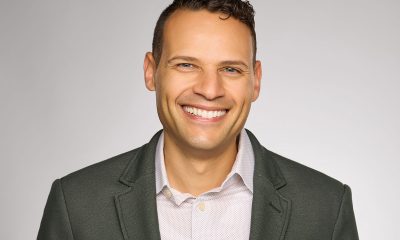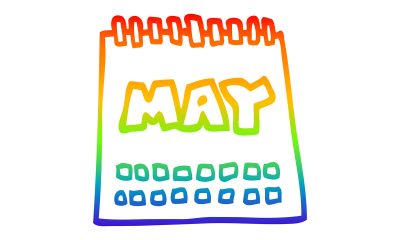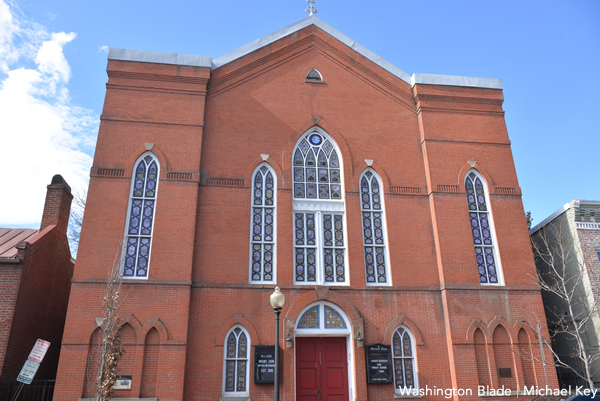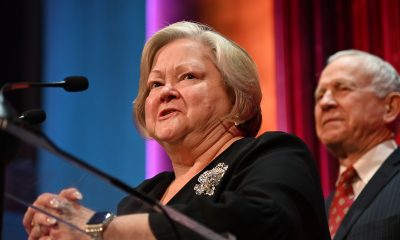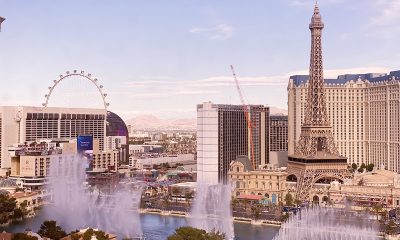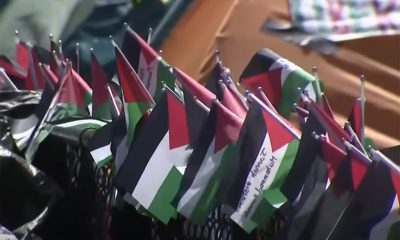a&e features
Do we still need D.C. Black Pride?
Activists weigh in on relevance of annual events in Trump era
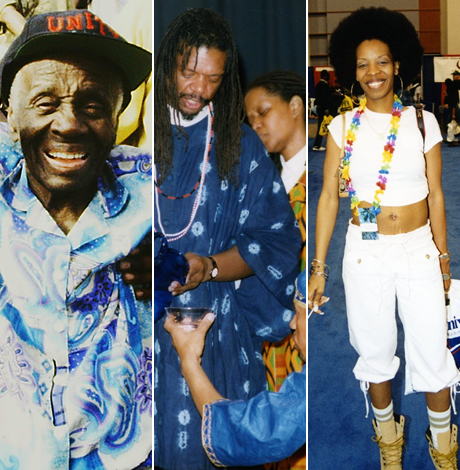
In 1991, I was a 30-year-old Air Force captain and closeted. I had worked hard to earn my degree and commission and loved the Air Force.
But “Don’t ask, Don’t Tell” was the law and I was always looking over my shoulder. Living two lives was physically and spiritually exhausting. I did go to the numerous bars that existed in D.C. at the time — they were fun, exciting and even dangerous. Gay bashing and HIV/AIDS were real hazards to living your life
I remember walking onto Banneker Field for the first DC Black Pride on Saturday, May 25, 1991 alone. It was the first time I was out in public, outside of the gay bar havens, with a group of black gay people, who looked like me and were dealing with the same issues I was dealing with. It was uplifting, refreshing and empowering. I bumped into a colleague from my office in the Pentagon who was in the Navy. We were not out to each other before. We laughed out loud, hugged and have been great friends ever since.
Now, 26 years later, LGBTQ people serve openly in the armed services. We have marriage equality at the federal level; and D.C. has some of the most LGBTQ positive laws in the world. Do we still need Black Pride? I posed this question to several LGBTQ leaders and activists. Here’s what they had to say:
Sheila Alexander-Reid, director, Mayor’s Office of LGBTQ Affairs, Washington, D.C. “Yes — People want to celebrate themselves with their own community and still do not see a lot of their community at Capital Pride.” She followed up by applauding Capital Pride’s efforts to make its board more diverse by including Ashley Smith and SaVanna Wanzer who are both African American. “If the leadership is not diverse, then outreach is not diverse, then attendance is not diverse.”
Dr. Anika Simpson, co-chair, Equality March for Unity and Pride. “Yes — we need safe places for Black LGBTQ people to come together to refresh and recreate; to come together in joy, solidarity and protest. The Equality March [set for June 11 in D.C.] intentionally has a majority of person of color leadership team, which has shifted the focus of the march. The mission centers very explicitly on those LGBTQ people who have been silent and neglected. There are 12 co-chairs: nine are black, Latino or Native American; the remaining three are white. Four are transgender or gender non-conforming.” Simpson added that this organization “shows the possibilities of where queer movements should go in the future.”
Ryan Bos, executive director, Capital Pride. “Yes, DC Black Pride offers that safe space for black LGBTQ people to learn and celebrate. Capital Pride is and will continue to help sponsor DC Black Pride.” Ryan stated that, “Capital Pride has a good relationship with DC Black Pride and that he’d continue to look for ways to foster partnerships.”
Peter Rosenstein, LGBTQ activist, planning committee member, Equality March for Unity and Pride. “Yes, DC Black Pride is still needed as a safe place for black LGBTQ people to come together and celebrate. It’s important that all voices are heard. On June 11, everyone needs to come together for the Equality March and resist — be unified to support and protect full civil rights for everyone – leaving no one behind.”
Abdur-Rahim Briggs, president and CEO, Project Briggs. “Yes, we still need Black Prides because of racism in the gay community. I do not see Capital Pride reaching into the black community.” Briggs does participate in Capital Pride. He has judged floats in the past and loves to march in the Pride Parade. He commented, “I would like to see more whites participate in Black Pride to build more bridges.” He’d also like to see more corporate funding to support Black Pride but he is wary of corporate control.
Ernest Hopkins, co-founder of D.C. Black Pride, legislative director, San Francisco AIDS Foundation: Yes — “Answer the question with a question, What is DC Black Pride to you? It still raises money to combat HIV/AIDS. It still provides a safe space, builds community and annual events that focus on black LGBTQ issues. The question answers itself — Yes!” Hopkins added, “There is one misconception that I must clear up. DC Black Pride was never a response or an alternative to Capital Pride. The original, Black and Lesbian Gay Pride Day, was established as a tool to sensitize the black gay community to the problems we were having with HIV/AIDS. Our friends were getting sick and needed money for rent, food and burial expenses.”
Chuck Hicks, community organizer, LGBTQ leader and historian. “Yes — Absolutely. The first Black Pride was held in D.C. as a fundraiser to help people struggling with HIV/AIDS. Welmore Cook took a leave of absence from Best Friends of DC Inc. to form the first black gay HIV/AIDS organization in DC to combat the disease. The Black Lesbian and Gay Pride Day Inc. eventually became DC Black Pride. Memorial Day weekend was chosen in homage to The Children’s Hour celebrations held at D.C.’s Club House. Black Prides became an expression of our lifestyle and culture that has spread worldwide. This wonderful result was completely unplanned. Black Prides also give black LGBTQ artists and entrepreneurs an opportunity to prosper.”
David Bruinooge, founder, Equality March for Unity and Pride. “Yes, people should celebrate anyway they want. So yes. Communities can come together in many different ways. The various Prides celebrate their unique identities. Communities should come together to celebrate their uniqueness and see themselves.” Asked what motivated his interest in the Equality March, he said, “It is even better when we can all come together and celebrate together. The Equality March centers the margins to highlight those that have been forgotten and neglected. More people must be educated to support [LGBTQ] people who live in the margins. We need to mobilize our community and allies and rally behind the voiceless and poor. It is time that those issues are centered. We need to stand together as one.”
Earl Fowlkes, executive director, Center for Black Equity. “Yes, Black Prides are annual events driven by attendance. If they were not relevant, no one would come. Our Prides provide an opportunity to celebrate being black and LGBTQ — a duality that has to be addressed and acknowledged. Black Prides have workshops, poetry slams, plays and visual arts. Black Prides are also social. Social media doesn’t replace socializing face-to-face. The big parties are important too as we lose black bars and clubs.”
The Center for Black Equity supports 32 member Black Prides that include major cities across the U.S., DC Black Pride and London. “I’m encouraging the other Black Prides to come to support the Equality March. All hands on deck.” Fowlkes is an Equality March honorary co-chair and he also feels that the march is important and must not fail due to lack of local support.
Khadijah Tribble, Ground Game, organizer, Equality March for Unity and Pride. “Yes, we need safe spaces and we need to be visible. We need DC Black Pride as long as we have people who are challenged about coming out and need resources. DC Black Pride has social as well as political consciousness and focus. Local D.C. politicians find some way to connect to DC Black Pride.” Tribble said she would like to see DC Black Pride workshops put more focus on “building, and rebuilding organizations, to create pipelines for new leaders, activists and entrepreneurs.” She would also like to see, “a method to pass national-level issues identified by Black Pride organizations to the DNC and Congressional Black Caucus for resolution.
Devin Barrington Ward, president, Impulse Group DC. “Yes, we need Black Prides now more than ever. As DC and the country change, it is more important than ever to have spaces created by and for black people to contribute to Chocolate City. DC is changing and gentrification is a fact not just a discussion. It’s harder for black folks to have black spaces, which is so important.” Asked if DC Black Pride was missing anything for younger people, he said, “As the president of Impulse group DC, I have the luxury and responsibility to create the things that are missing.” Ward recognizes his privilege as a cis-gender black queer man. “Trans people will think differently. Our spaces will always be inclusive of trans and gender nonconforming folks.” Impulse Group’s mission is to educate gay, bisexual and queer men about HIV.
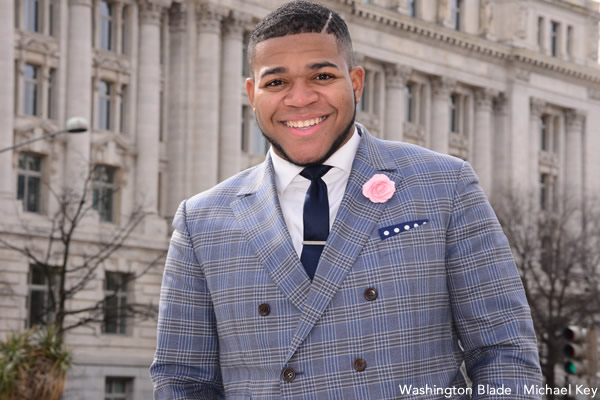
Whitman-Walker Health has announced Devin Barrington Ward will become its new communications director. (Washington Blade photo by Michael Key)
Dr. Ron Simmons, executive director emeritus, Us Helping Us. “Yes, the initial purpose of DC Black Pride was to raise money for HIV/AIDS organizations. Black gay men and lesbians need to be affirmed and see themselves as part of empowerment. You don’t see yourself at white pride. The events they have may not be what you need. It is like the difference between going to a white club and a black club.” Asked about the Equality March, he replied, “I think people must participate in the national march. We must be seen as part of the national community. As a young person, going to the gay march showed me I was not alone. Everyone should actually march and go to the rally.”
Jamil Fletcher, publisher, SWERV Magazine. “Yes, we still need to celebrate Black LGBTQ Pride. We actually need it now more than ever given the state of the world today. At the root, Black Prides are about building community. A community that is empowered, healthy, financially strong, educated, and vibrant. Those of us living at this unique intersection of being black and queer know too well the challenges within our community. Pride affords us an opportunity to come together in a way that embraces all of our identities without condition.”
It was a unanimous, resounding “yes,” we still need DC Black Pride for the health and vitality of black LGBTQ communities. As the White House submits its budget to Congress this week, it’s clear that health and social services programs are being reduced to levels that threaten LGBTQ communities, particularly those already living in the margins. Moreover, several states are pushing anti-LGBTQ legislation, bringing a renewed sense of urgency to both Black Pride and the upcoming Equality March for Unity and Pride
Marvin Bowser is a lifestyle blogger and Blade contributor. Follow him on Instagram @FirstBroDC.
a&e features
Pride season has begun
LGBTQ parades, festivals to be held throughout region in coming months
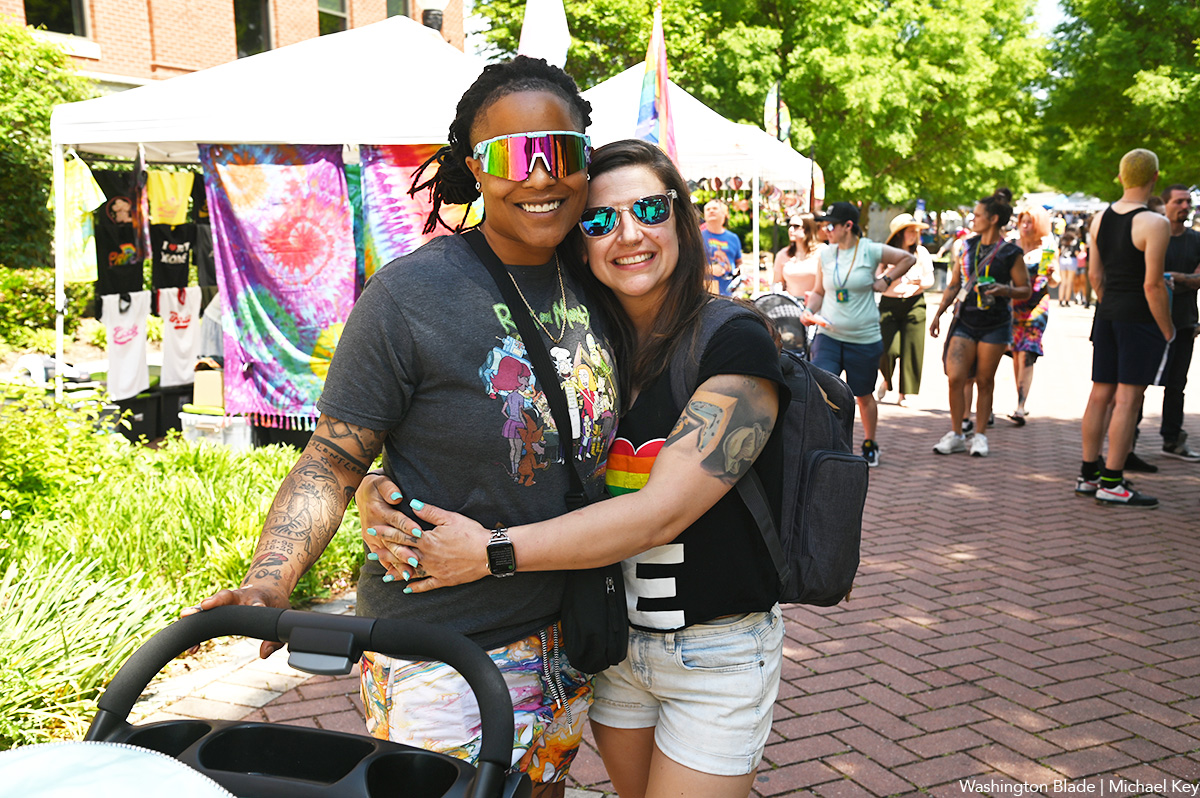
LGBTQ Pride festivals, parades and other events have been scheduled in large cities and small towns throughout the region. Pride events around the world culminate in June, but organizers in some municipalities have elected to hold celebrations in other months.
Pride in the region has already begun with last weekend’s Mr., Miss, and Mx. Capital Pride Pageant held at Penn Social as well as Roanoke Pride Festival held in Elmwood Park in Roanoke, Va.
Below is a list of Pride events coming to the region.
MAY
Capital Trans Pride is scheduled for 9:30 a.m.-5 p.m. on Saturday, May 18 at the Martin Luther King, Jr. Memorial Library (901 G St., N.W.). The website for the event advertises workshops, panel discussions, a keynote address, a resource fair and more. transpridewashingtondc.org
Equality Prince William Pride is scheduled for 12-4 p.m. on May 18 at the Harris Pavilion (9201 Center St.) in historic downtown Manassas, Va. equalityprincewilliam.org
D.C. Black Pride holds events throughout the city May 24-27. Highlights include an opening reception, dance parties and a community festival at Fort Dupont Park. The Westin Washington, DC Downtown (999 9th St., N.W.) is the host hotel, with several events scheduled there. dcblackpride.org
NOVA Pride and Safe Space NOVA will hold NOVA Pride Prom from 7-11 p.m. on May 31 at Torpedo Factory Art Center in Alexandria, Va. The event is open to all high school students throughout the region, regardless of identity, from rising ninth grade students to graduating seniors. novapride.org
Capital Pride Honors will be held on May 31. The Capital Pride Alliance has announced on its website that nominations are open for awardees. The Honors celebrates excellence in the LGBTQ community and its allies. capitalpride.org
JUNE
Downtown Sykesville Connection is sponsoring Sykesville Pride Day in downtown Sykesville, Md. on June 1 from 12-4 p.m. downtownsykesville.com
Reston Pride will be held at Lake Anne Plaza in Reston, Va. on June 1 from 12-6 p.m. restonpride.org
Fairfax Pride, hosted by the City of Fairfax and George Mason University, will be held at Old Town Hall (3999 University Drive, Fairfax, Va.) on June 1 from 5-7 p.m. The event will include children’s activities and more. fairfaxva.gov
OEC Pride celebrates Pride with “art, dance, education, and fun” in Old Ellicott City. The OEC Pride Festival is held along Main Street in Ellicott City, Md. on June 1 from 10 a.m.-10 p.m. visitoldellicottcity.com
Annapolis Pride has consistently drawn a giant crowd for a parade and festival in the quaint downtown of the Maryland capital. “The Voice” star L. Rodgers has been announced to headline the 2024 festival. The parade and festival will be held on June 1. annapolispride.org
The Alexandria LGBTQ+ Task Force Alexandria Pride is scheduled to be held at Alexandria City Hall from 3 – 6 p.m. on June 1 in Alexandria, Va. alexandriava.gov
The Portsmouth Pride Fest will be held at Festival Park adjacent to the Atlantic-Union Bank Pavilion in Portsmouth, Va. on June 1 from 11 a.m.-5 p.m. portsmouthprideva.com
The Delaware Pride Festival is a free event scheduled for June 1 at Legislative Hall in Dover, Del. from 10 a.m.-5 p.m.The event is billed as family friendly and open to people of all ages and sexual orientations. delawarepride.org
The City of Rockville is hosting Rockville Pride at Rockville Town Square (131 Gibbs St., Rockville, Md.) from 2-5 p.m. on June 2. The free event features live performances, information booths, and children’s activities. rockvillemd.gov
Equality Loudoun is hosting the ticketed Loudoun Pride Festival from 1-7 p.m. on June 2 at Claude Moore Park in Sterling, Va. The event features three stages, a “#Dragstravaganza,” a kid’s zone, an alcohol pavilion, a food hall and more. Tickets $5. eqloco.com
Culpepper Pride is slated to be held at Mountain Run Winery in Culpepper, Va. from 12-6 p.m. on June 2. The theme this year is “True Colors.” culpeperpride.org
The Southwest Virginia Pride Cookout Community Social is planned for 2 p.m. at the Charles R. Hill Senior Center in Vinton, Va. on June 2. For more information, visit the Facebook event page.
Capital Pride kicks off with the RIOT! Opening Party at Echostage starting at 9 p.m. on June 7. Tickets run from $27-$50 and can be purchased on the Capital Pride website. The event is set to feature Sapphire Cristál. capitalpride.org
Pride events continue over the weekend of June 8-9 in the nation’s capital with the Capital Pride Block Party featuring performers and a beverage garden, the massive Capital Pride Parade, Flashback: A totally Radical Tea Dance to be held at the end of the parade route, and the Capital Pride Festival and Concert. Visit capitalpride.org for more information. Other Pride events planned for the weekend in D.C. include a number of parties and the unforgettable (and free) Pride on the Pier & Fireworks Show at the Wharf sponsored by the Washington Blade from 2-10 p.m. prideonthepierdc.com
Pride in the ‘Peake will be held at Summit Pointe (580 Belaire Ave.) in Chesapeake, Va. on June 9 from 12-5 p.m. The family-focused Pride event does not serve alcohol, but will feature community organizations, food trucks and more in a street festival. For more information, visit the Facebook event page.
Celebrate with a drag show, dancing and a lot of wine at Two Twisted Posts Winery in Purcellville, Va. for a Pride Party from 2-5 p.m. on June 15. twotwistedposts.com
Baltimore Pride holds one of the largest Pride parades in the region on June 15 in Baltimore. (2418 Saint Paul St.). The parade concludes with a block party and festival. Pride events are scheduled from June 14-16. baltimorepride.org
The fourth annual Catonsville Pride Fest will be held at the Catonsville Presbyterian Church (1400 Frederick Rd.) in Catonsville, Md. on June 15 from 3-6 p.m. The event features a High Heel Race, pony rides, face painting, local cuisine and more. For more information, visit the Facebook event page.
The Ghent Business District Palace Shops have announced a Ghent Pride event from 5:30-9:30 p.m. on June 17 at the Palace Shops and Station (301 W 21st Street) in Norfolk, Va. ghentnorfolk.org
An event dedicated to celebrating the elders in the LGBTQ community, Silver Pride is scheduled for June 20 at 5:30-8:30 p.m. Location and more information to be announced soon. capitalpride.org
Visit the Hampton Roads PrideFest and Boat Parade for a truly unique Pride experience along the Elizabeth River. The full day of entertainment, education and celebration will be held on June 22 from 12-7 p.m. at Town Point Park (113 Waterside Dr.) in Norfolk, Va. hamptonroadspride.org
Frederick, Md. will hold its annual Frederick Pride Festival at Carroll Creek Linear Park on June 22 from 11 a.m.-6 p.m. Entertainers include CoCo Montrese of “RuPaul’s Drag Race.” frederickpride.org
The fourth annual Pride at the Beach is scheduled for 2-10 p.m. on June 23 at Neptune’s Park (3001 Atlantic Ave.) in Virginia Beach, Va. The event features entertainment, community vendors, beachside DJ sets, food trucks and offers a “perfect conclusion to an unforgettable Pride weekend.” hamptonroadspride.org
Winchester Pride will hold its Mx. Winchester Pride Pageant at 15 N. Loudoun St. in Winchester, Va. on June 23 at 6 p.m. Tickets are $20 in advance/$25 at the door. winchesterpride.com
The organizers of last year’s inaugural Ocean City Pride with a “parade” along the boardwalk in Ocean City, Md. have announced that they will be organizing a return this year with events from June 28-30. instagram.com
The third annual Arlington Pride Festival will be held at Long Bridge Park at National Landing (475 Long Bridge Dr.) in Arlington, Va. on June 29 from 11 a.m.-3 p.m. arlvapride.com
FXBG Pride is holding its annual community Fredericksburg Pride March on June 29 from 10-11 a.m. at Riverfront Park (705 Sophia St.) in Fredericksburg, Va. Speeches begin at 10 a.m. and the procession starts at 10:30 a.m. For more information, visit the Facebook event page.
Salisbury Pride “90’s Edition” is scheduled for 3 – 7 p.m. on June 29 in Downtown Salisbury, Md. Magnolia Applebottom is listed as the headliner and grand marshal. salisburyprideparade.com
The 2024 Suffolk Pride Festival is scheduled for Bennett’s Creek Park in Suffolk, Va. on June 30 from 12-7 p.m. Visit the Facebook event page for more information.
Expect music, entertainment and drag performances in the picturesque mountain town of Cumberland, Md. at the Cumberland Pride Festival on June 30 from 12-4 p.m. at Canal Place. cumberlandpride.org
Montgomery County’s annual Pride in the Plaza will be held on June 30 from 12-8 p.m. at Veterans Plaza (1 Veterans Place, Silver Spring, Md. liveinyourtruth.org
JULY
The sixth annual Westminster Pride Festival is scheduled for downtown Westminster, Md. on July 13 from 12-6 p.m. westminsterpride.org
Hagerstown Hopes is holding its annual Hagerstown Pride Festival in Doubs Woods Park (1307 Maryland Ave.) in Hagerstown, Md. on July 13 at 11 a.m. Visit the Facebook event page for more information.
The Rehoboth Beach Pride Festival will be held on July 20 from 10 a.m.-2 p.m., with other Sussex Pride events scheduled throughout the weekend of July 18-21. sussexpride.org
Us Giving Us Richmond hosts Black Pride RVA in Richmond, Va. with events on July 19-21. ugrcrva.org
a&e features
Eastern Shore chef named James Beard Finalist
Harley Peet creates inventive food in an inclusive space

In a small Eastern Shore town filled with boutiques, galleries, and the occasional cry of waterfowl from the Chesapeake, Chef Harley Peet is most at home. In his Viennese-inflected, Maryland-sourced fine-dining destination Bas Rouge, Peet draws from his Northern Michigan upbringing, Culinary Institute of America education, and identity as a gay man, for inspiration.
And recently, Peet was named a James Beard Finalist for Best Chef: Mid-Atlantic – the first “Best Chef: Mid-Atlantic” finalist representing the Eastern Shore.
Peet, after graduation from the Culinary Institute of America, took a position as sous chef at Tilghman Island Inn, not far from Bas Rouge. Falling in love with the Eastern Shore, he continued his passion for racing sailboats, boating, gardening, and fishing, and living his somewhat pastoral life as he opened Bas Rouge in 2016 as head chef, a restaurant part of the Bluepoint Hospitality group, which runs more than a dozen concepts in and around Easton, Md.
Coming from a rural area and being gay, Peet knew he had his work cut out for him. He was always aware that the service and hospitality industry “can be down and dirty and rough.”
Now as a leader in the kitchen, he aims to “set a good example, and treat people how I want to be treated. I also want to make sure if you’re at our establishment, I’m the first to stand up and say something.”
The Bas Rouge cuisine, he says, is Contemporary European. “I’m inspired by old-world techniques of countries like Austria, Germany, and France, but I love putting a new spin on classic dishes and finding innovative ways to incorporate the bounty of local Chesapeake ingredients.”
His proudest dish: the humble-yet-elevated Wiener Schnitzel. “It is authentic to what one would expect to find in Vienna, down to the Lingonberries.” From his in-house bakery, Peet dries and grinds the housemade Kaiser-Semmel bread to use as the breadcrumbs.
Peet works to support the LGBTQ community inside and outside of the kitchen. “I love that our Bluepoint Hospitality team has created welcoming spaces where our patrons feel comfortable dining at each of our establishments. Our staff have a genuine respect for one another and work together free of judgment.”
Representing Bluepoint, Peet has participated in events like Chefs for Equality with the Human Rights Campaign, advocating for LGBTQ rights.
At Bas Rouge, Peet brings together his passion for inclusion steeped in a sustainability ethic. He sees environmental stewardship as a way of life. Peet and his husband have lived and worked on their own organic farm for several years. Through research in Europe, he learned about international marine sourcing. Witnessing the impacts of overfishing, Peet considers his own role in promoting eco-friendly practices at Bas Rouge. To that end, he ensures responsible sourcing commitments through his purveyors, relationships that have helped create significant change in how people dine in Easton.
“I have built great relationships in the community and there’s nothing better than one of our long-standing purveyors stopping in with a cooler of fresh fish from the Chesapeake Bay. This goes especially for catching and plating the invasive blue catfish species, which helps control the species’ threat to the local ecosystem.
Through his kitchen exploits, Peet expressed a unique connection to another gay icon in a rural fine-dining restaurant: Patrick O’Connell, of three Michelin starred Inn at Little Washington. In fact, Peet’s husband helped design some of O’Connell’s kitchen spaces. They’ve both been able to navigate treacherous restaurant-industry waters, and have come out triumphant and celebrated. Of O’Connell, Peet says that he “sees [his restaurants] as canvas, all artistry, he sees this as every night is a show.” But at the same time, his “judgment-free space makes him a role model.”
Being in Easton itself is not without challenges. Sourcing is a challenge, having to either fly or ship in ingredients, whereas urban restaurants have the benefit of trucking, he says. The small town “is romantic and charming,” but logistics are difficult – one of the reasons that Peet ensures his team is diverse, building in different viewpoints, and also “making things a hell of a lot more fun.”
Reflecting on challenges and finding (and creating) space on the Eastern Shore, Peet confirmed how important it was to surround himself with people who set a good example, and “if you don’t like the way something is going … move on.”
a&e features
What to expect at the 2024 National Cannabis Festival
Wu-Tang Clan to perform; policy discussions also planned

(Editor’s note: Tickets are still available for the National Cannabis Festival, with prices starting at $55 for one-day general admission on Friday through $190 for a two-day pass with early-entry access. The Washington Blade, one of the event’s sponsors, will host a LGBTQIA+ Lounge and moderate a panel discussion on Saturday with the Mayor’s Office of LGBTQ Affairs.)
With two full days of events and programs along with performances by Wu-Tang Clan, Redman, and Thundercat, the 2024 National Cannabis Festival will be bigger than ever this year.
Leading up to the festivities on Friday and Saturday at Washington, D.C.’s RFK Stadium are plenty of can’t-miss experiences planned for 420 Week, including the National Cannabis Policy Summit and an LGBTQ happy hour hosted by the District’s Black-owned queer bar, Thurst Lounge (both happening on Wednesday).
On Tuesday, the Blade caught up with NCF Founder and Executive Producer Caroline Phillips, principal at The High Street PR & Events, for a discussion about the event’s history and the pivotal political moment for cannabis legalization and drug policy reform both locally and nationally. Phillips also shared her thoughts about the role of LGBTQ activists in these movements and the through-line connecting issues of freedom and bodily autonomy.
After D.C. residents voted to approve Initiative 71 in the fall of 2014, she said, adults were permitted to share cannabis and grow the plant at home, while possession was decriminalized with the hope and expectation that fewer people would be incarcerated.
“When that happened, there was also an influx of really high-priced conferences that promised to connect people to big business opportunities so they could make millions in what they were calling the ‘green rush,'” Phillips said.
“At the time, I was working for Human Rights First,” a nonprofit that was, and is, engaged in “a lot of issues to do with world refugees and immigration in the United States” — so, “it was really interesting to me to see the overlap between drug policy reform and some of these other issues that I was working on,” Phillips said.
“And then it rubbed me a little bit the wrong way to hear about the ‘green rush’ before we’d heard about criminal justice reform around cannabis and before we’d heard about people being let out of jail for cannabis offenses.”
“As my interests grew, I realized that there was really a need for this conversation to happen in a larger way that allowed the larger community, the broader community, to learn about not just cannabis legalization, but to understand how it connects to our criminal justice system, to understand how it can really stimulate and benefit our economy, and to understand how it can become a wellness tool for so many people,” Phillips said.
“On top of all of that, as a minority in the cannabis space, it was important to me that this event and my work in the cannabis industry really amplified how we could create space for Black and Brown people to be stakeholders in this economy in a meaningful way.”

“Since I was already working in event production, I decided to use those skills and apply them to creating a cannabis event,” she said. “And in order to create an event that I thought could really give back to our community with ticket prices low enough for people to actually be able to attend, I thought a large-scale event would be good — and thus was born the cannabis festival.”
D.C. to see more regulated cannabis businesses ‘very soon’
Phillips said she believes decriminalization in D.C. has decreased the number of cannabis-related arrests in the city, but she noted arrests have, nevertheless, continued to disproportionately impact Black and Brown people.
“We’re at a really interesting crossroads for our city and for our cannabis community,” she said. In the eight years since Initiative 71 was passed, “We’ve had our licensed regulated cannabis dispensaries and cultivators who’ve been existing in a very red tape-heavy environment, a very tax heavy environment, and then we have the unregulated cannabis cultivators and cannabis dispensaries in the city” who operate via a “loophole” in the law “that allows the sharing of cannabis between adults who are over the age of 21.”
Many of the purveyors in the latter group, Phillips said, “are looking at trying to get into the legal space; so they’re trying to become regulated businesses in Washington, D.C.”
She noted the city will be “releasing 30 or so licenses in the next couple of weeks, and those stores should be coming online very soon” which will mean “you’ll be seeing a lot more of the regulated stores popping up in neighborhoods and hopefully a lot more opportunity for folks that are interested in leaving the unregulated space to be able to join the regulated marketplace.”
National push for de-scheduling cannabis
Signaling the political momentum for reforming cannabis and criminal justice laws, Wednesday’s Policy Summit will feature U.S. Sens. Raphael Warnock (D-Ga.), Jeff Merkley (D-Ore.), Elizabeth Warren (D-Mass.), and Chuck Schumer (D-N.Y.), the Senate majority leader.
Also representing Capitol Hill at the Summit will be U.S. Congresswoman Eleanor Holmes Norton (D-D.C.) and U.S. Reps. Earl Blumenauer (D-Ore.) and Barbara Lee (D-Calif.) — who will be receiving the Supernova Women Cannabis Champion Lifetime Achievement Award — along with an aide to U.S. Rep. David Joyce (R-Ohio).
Nationally, Phillips said much of the conversation around cannabis concerns de-scheduling. Even though 40 states and D.C. have legalized the drug for recreational and/or medical use, marijuana has been classified as a Schedule I substance since the Controlled Substances Act was passed in 1971, which means it carries the heftiest restrictions on, and penalties for, its possession, sale, distribution, and cultivation.
The U.S. Department of Health and Human Services formally requested the drug be reclassified as a Schedule III substance in August, which inaugurated an ongoing review, and in January a group of 12 Senate Democrats sent a letter to the Biden-Harris administration’s Drug Enforcement Administration urging the agency to de-schedule cannabis altogether.
Along with the Summit, Phillips noted that “a large contingent of advocates will be coming to Washington, D.C. this week to host a vigil at the White House and to be at the festival educating people” about these issues. She said NCF is working with the 420 Unity Coalition to push Congress and the Biden-Harris administration to “move straight to de-scheduling cannabis.”
“This would allow folks who have been locked up for cannabis offenses the chance to be released,” she said. “It would also allow medical patients greater access. It would also allow business owners the chance to exist without the specter of the federal government coming in and telling them what they’re doing is wrong and that they’re criminals.”
Phillips added, however, that de-scheduling cannabis will not “suddenly erase” the “generations and generations of systemic racism” in America’s financial institutions, business marketplace, and criminal justice system, nor the consequences that has wrought on Black and Brown communities.
An example of the work that remains, she said, is making sure “that all people are treated fairly by financial institutions so that they can get the funding for their businesses” to, hopefully, create not just another industry, but “really a better industry” that from the outset is focused on “equity” and “access.”
Policy wonks should be sure to visit the festival, too. “We have a really terrific lineup in our policy pavilion,” Phillips said. “A lot of our heavy hitters from our advocacy committee will be presenting programming.”
“On Saturday there is a really strong federal marijuana reform panel that is being led by Maritza Perez Medina from the Drug Policy Alliance,” she said. “So that’s going to be a terrific discussion” that will also feature “representation from the Veterans Cannabis Coalition.”
“We also have a really interesting talk being led by the Law Enforcement Action Partnership about conservatives, cops, and cannabis,” Phillips added.
Cannabis and the LGBTQ community
“I think what’s so interesting about LGBTQIA+ culture and the cannabis community are the parallels that we’ve seen in the movements towards legalization,” Phillips said.
The fight for LGBTQ rights over the years has often involved centering personal stories and personal experiences, she said. “And that really, I think, began to resonate, the more that we talked about it openly in society; the more it was something that we started to see on television; the more it became a topic in youth development and making sure that we’re raising healthy children.”
Likewise, Phillips said, “we’ve seen cannabis become more of a conversation in mainstream culture. We’ve heard the stories of people who’ve had veterans in their families that have used cannabis instead of pharmaceuticals, the friends or family members who’ve had cancer that have turned to CBD or THC so they could sleep, so they could eat so they could get some level of relief.”
Stories about cannabis have also included accounts of folks who were “arrested when they were young” or “the family member who’s still locked up,” she said, just as stories about LGBTQ people have often involved unjust and unnecessary suffering.
Not only are there similarities in the socio-political struggles, Phillips said, but LGBTQ people have played a central role pushing for cannabis legalization and, in fact, in ushering in the movement by “advocating for HIV patients in California to be able to access cannabis’s medicine.”
As a result of the queer community’s involvement, she said, “the foundation of cannabis legalization is truly patient access and criminal justice reform.”
“LGBTQIA+ advocates and cannabis advocates have managed to rein in support of the majority of Americans for the issues that they find important,” Phillips said, even if, unfortunately, other movements for bodily autonomy like those concerning issues of reproductive justice “don’t see that same support.”

